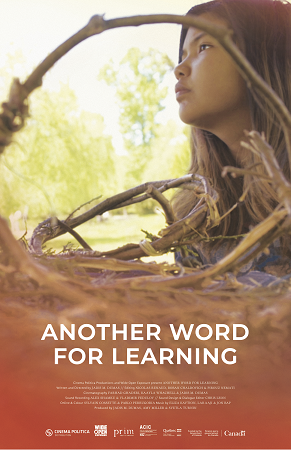
Another Word For Learning 2019
Distributed by Good Docs
Produced by Jadis Dumas and Amy Miller
Directed by Jadis Dumas
Streaming, 72 mins
Middle School - General Adult
Decolonial Studies; Educational Equity; Indigenous Studies; Sociology
Date Entered: 11/03/2022
Reviewed by Giovanna Colosi, Librarian for the School of Education, Subject Instruction Lead, Syracuse UniversityAnother Word for Learning follows the scholastic journey of 11 year old Aisha O’Sullivan a Kwakwaka’wakw girl who is choosing how she wants to be educated while living in Vancouver’s Downtown Eastside. Her mother, activist Gunargie O’Sullivan, who is a local radio personality, helps guide Aisha through her journey. Aisha is a bright and talkative tween who feels ignored in the traditional school setting. Aisha has ambitions to discover other alternative ways of learning while affirming her Indigenous sense of identity and understanding. At one point in the movie, she talks about how school for her would work better if they taught more hands-on skills and art other than just science, languages, etc.
Moreso, not only following the mother-daughter duo, Another Word for Learning examines the disconnect between the contemporary colonial educational system and Indigenous communities, considering Canada’s Truth and Reconciliation Commission (TRC).
Canada’s Truth and Reconciliation Commission was officially established on June 1, 2008, with the purpose of recording the history and lasting effects of the Canadian Indian residential school system on Indigenous students and their families. It offered residential school survivors an opportunity to share their experiences during public and private meetings held across the country. “The TRC emphasizes that it has a priority of displaying the impacts of the residential schools to the Canadians who have been kept in the dark from these matters.” (“Truth and Reconciliation Commission of Canada.” Wikipedia. Wikipedia.org, 31, Oct, 2022, https://en.wikipedia.org/wiki/Truth_and_Reconciliation_Commission_of_Canada#cite_note-5)
This film would be a useful addition to collections supporting coursework in Native American Studies or Indigenous Peoples as well as education programs looking at alternative educational models. It would also be suitable for younger audiences studying Native American cultures.
Awards:Best Cinematography, Dada Saheb Phalke Film Festival; Official Competition, Local Sightings Film Festival; Official Competition, DOXA Documentary Film Festival; Official Competition, Garifuna International Festival; Official Competition, RIDM
Published and licensed under the Creative Commons Attribution 4.0 license. Anyone can use these reviews, so long as they comply with the terms of the license.